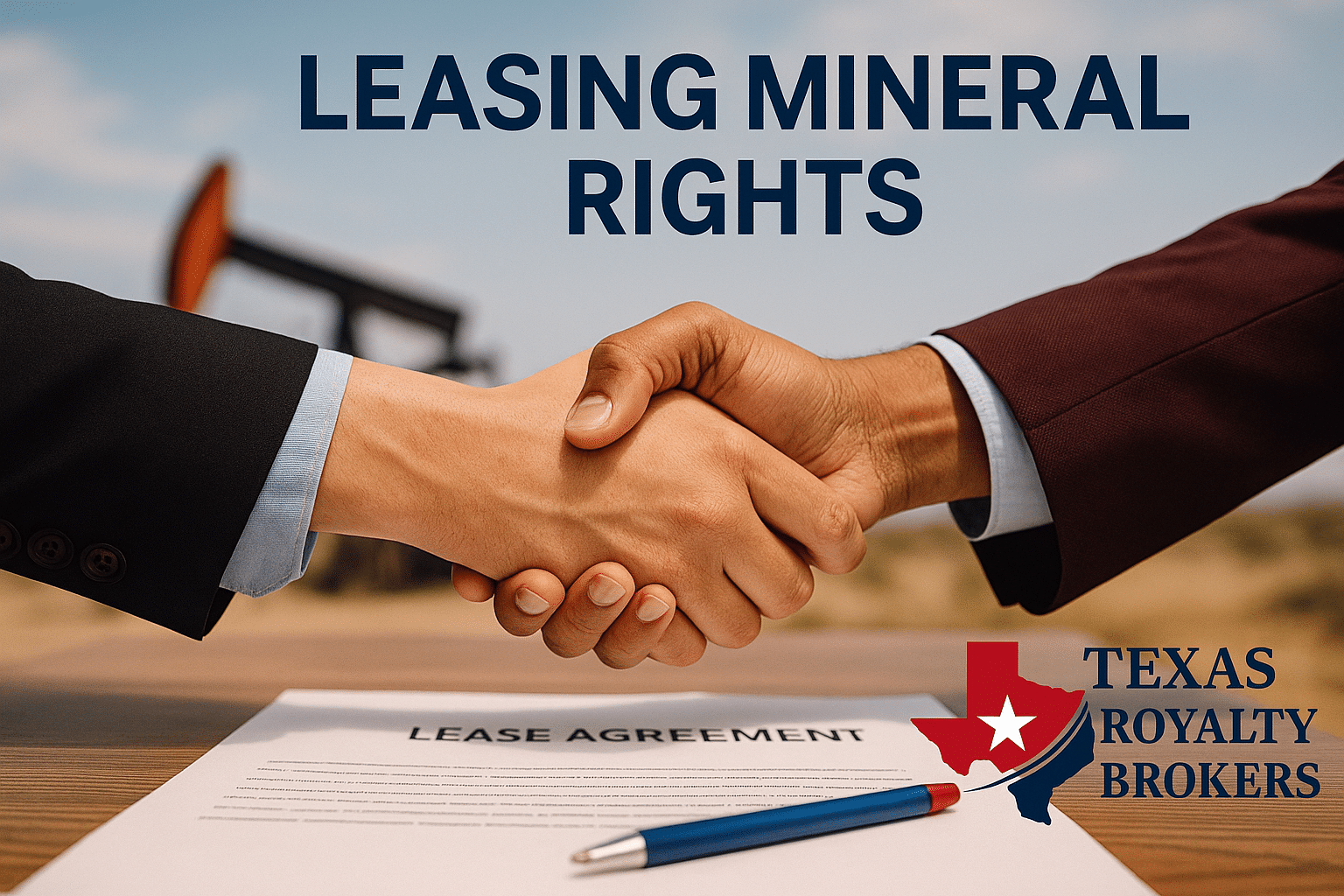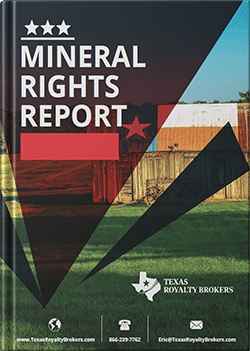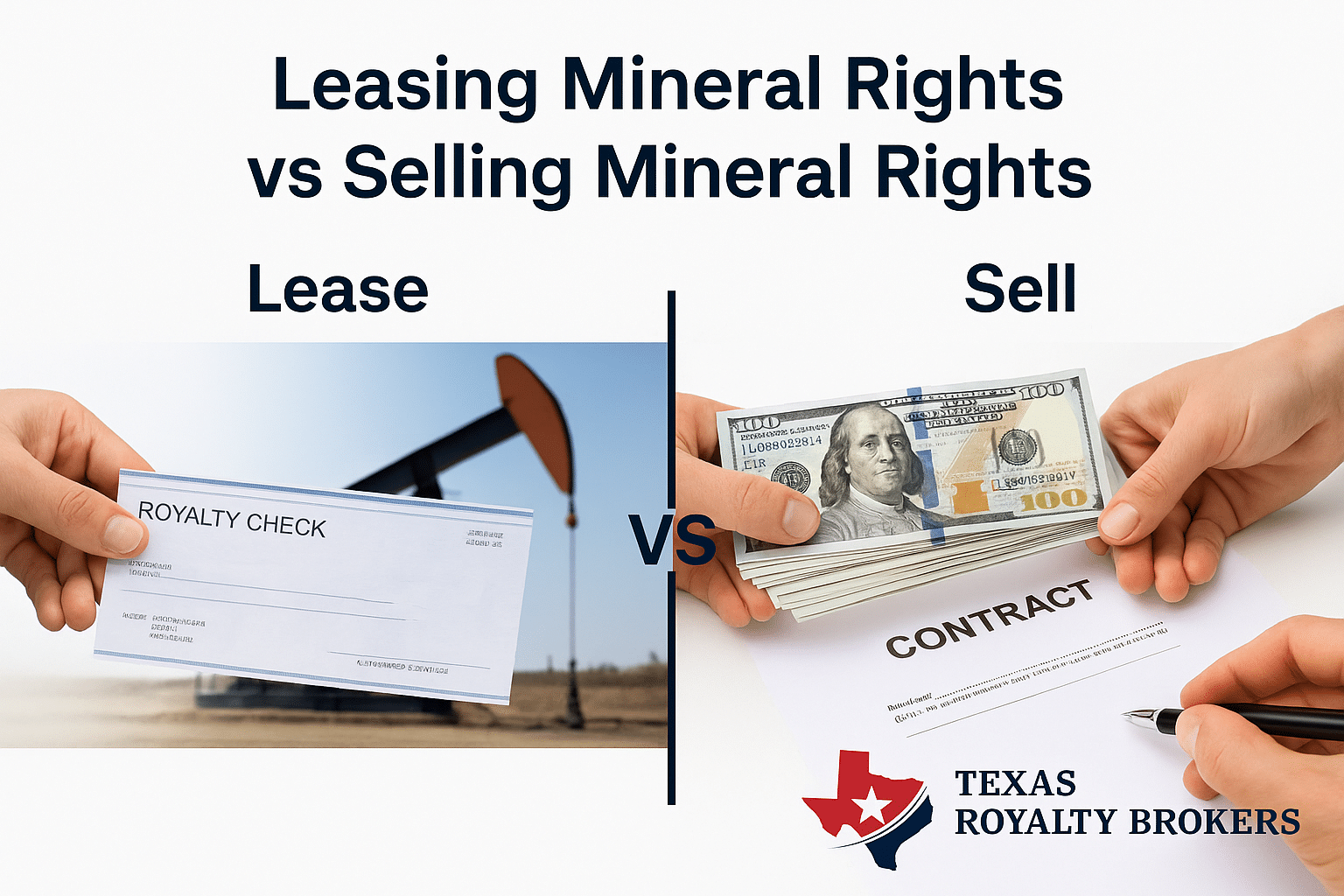Why Texas Royalty Brokers?
sellers
Buyers
State Specific Guides
Resources
Leasing Mineral Rights
Curious about leasing mineral rights? We explain everything you need to know about leasing mineral rights in Texas. This information also applies to leasing mineral rights in any state.
Before you lease mineral rights there are some important things to understand. After reading this article you will understand:
- What a mineral lease is
- Important lease terms
- How to lease your mineral rights
- What is a fair offer to lease mineral rights
- How to negotiate a mineral rights lease
- How a mineral right lease effects mineral rights value
Do not accept a lease agreement until you have reviewed the information below. Contact us for a free consultation to determine if your oil and gas lease agreement seems fair.
What is an Oil and Gas Mineral Rights Lease?
When leasing mineral rights, you should understand what a mineral right lease does. A mineral lease gives an operator (the company who drills for oil) the right but not the obligation to drill for oil.
When an operator identifies an area they want to drill, they will research who owns the mineral rights (oil and gas) underground. They will then approach each owner and make an offer to lease your mineral rights. This lease does two things:
- It gives them the ability to drill
- It determines your share of money from extracting oil and/or gas
Once an operator has leased all owners, they have the ability to drill. It’s important to point out that it is very common for an operator to lease mineral rights and never drill. You might be leased multiple times before drilling ever occurs.
Can you be forced to sign a lease? Technically no.
However, if you refuse to sign a lease you can’t prevent an operator from drilling for oil. If you could, a single owner could hold up drilling and nothing would ever get drilled. If you refuse to sign a lease, you will be force pooled if drilling does actually occur. This means you refused to sign a lease but you are still going to be paid for your share of the income generated. Generally speaking, you do not want to be force pooled. You have no ability to negotiate if you are force pooled.
How to Lease Mineral Rights
We are often approached by clients who want to lease their mineral rights. They ask us what the best way to lease the mineral rights is.
The answer is that you can’t really do anything to lease your mineral rights. Operators will decide when and where they want to drill. They will then contact you to secure a lease so they can begin drilling.
You can’t approach an operator and ask them to lease because it simply doesn’t work that way. They will approach you when they are ready to lease.
The only thing you can do ensure your mineral rights are ready to be leased is making sure you are easy to find. If you have moved, make sure you file a change of address with the USPS. You may even file something at the county clerk where you own the mineral rights to ensure your address is updated and on file.
One of the challenges of mineral rights ownership is that you don’t always have control over the situation. Leasing mineral rights is a sit and wait game until you are approached to lease.
Important Lease Terms
When an operator approaches you to lease your mineral rights, they will provide you lease agreement to sign. While these agreements are somewhat standard, there are certain terms that you should pay attention to. These are the terms that will ultimately determine how good or bad your lease is.
Royalty Rate / Royalty Percentage / Lease Rate: This is the most important mineral lease term. The legal minimum is 12.5%. The maximum is 25%. Technically there is no maximum, but 25% is the industry maximum that operators will pay. The higher your royalty percentage, the more you will be paid once oil and gas is taken out of the ground.
Lease bonus: When an operator offers you a lease, they will pay you for the right to drill for a period of time. This is called a lease bonus. The higher the lease bonus the better. A lease bonus could be $50/acre or $10,000/acre depending on your location. Amounts above $10,000/acre are possible, but exceptionally rare. The average lease bonus is between $500/acre and $2,500/acre. However, this average is very location specific. In some counties you won’t get $500/acre and in some counties accepting anything less than $2,500/acre is a bad deal.
Important: Your royalty rate and lease bonus are tied together. If you take a smaller up front lease bonus, you can negotiate a higher royalty rate. For example, if you are offered $2,500/acre and a 20% lease, you could negotiate for $2,000/acre and a 25% royalty rate. You are paid less up front, but the 5% higher royalty rate will pay off if drilling occurs.
Lease Term + Extension: In Texas, the standard lease term is a 3 + 3. This means that the operator has 3 years from the date the lease is signed to drill. In addition, an extension is almost always included in the lease. The extension gives the operator the right but not the obligation to renew your lease for an additional 3 years. This means the lease you are signing could be as long as 6 years, at the sole discretion of the operator if they choose to extend. In other parts of the country, (specifically the Northeast) a 5 + 5 is more common.
Pugh Clause: A pugh clause prevents an operator from leasing mineral rights, putting a portion of the mineral rights into a unit, drilling on those unitized mineral rights, and then holding the other mineral rights hostage with the lease even though you aren’t being paid for them. You should always have a pugh clause in your lease agreement. In Texas, a Pugh clause is standard. However, you should double check to ensure it’s included.
Deductions: If you are a savvy mineral owner in a good location, you can negotiate for no deductions. This means that the operator can’t deduct certain expenses from the royalties they pay you. This includes things like field expenses, marketing, and transportation costs.
Depth Restrictions: While very rare, you can negotiate for depth restrictions. This is uncommon in Texas. In places like WV and PA, you may want to negotiate depth based on which formations they plan to hit. In Texas, trying to negotiate depth restrictions is not necessary (and would be considered annoying) unless you have a very specific reason to do this.
How to Negotiate a Mineral Rights Lease
What is the best way to negotiate a mineral right lease?
Refer to the lease agreement terms we listed above. These are the lease terms you want to negotiate.
What lease terms you negotiate and how aggressive you are depends on your location and how many acres you own. If you are in an active county with a lot of active rigs, you have more room to negotiate. How many net mineral acres you own also pays a role. If you have 1 acre, you have a lot less negotiating power than someone who has 120 net mineral acres.
Royalty Rate: The legal minimum is 12.5%. If you are offered a 12.5% lease, try and negotiate a 3/16th (18.75%) royalty. If you are in a good location and you get offered a 3/16th, try for a 25%. Whatever they offer up front, negotiate for a higher royalty rate unless you get a 25% lease rate offer. Here are the common royalty rates:
- 12.5% (common, but bad)
- 16% (uncommon)
- 18.75% (very common)
- 20% (common)
- 22% (uncommon)
- 23% (uncommon)
- 25% (common in good areas)
Do not try and negotiate some weird lease rate that isn’t listed above. It will make you appear to have no idea what you’re doing. Stick with the common rates listed above generally speaking.
Lease bonus: Ask for around 25% more lease bonus than what they offer inititally. However, use this as a tool to negotiate your lease royalty rate higher. If they offer you $2,500/acre and a 20% lease, counter at $3,000/acre and 25%. Ideally, you stay at $2,500/acre but get to bump your lease royalty rate to 25%.
Lease Term: Don’t accept anything higher than a 3+3 in Texas.
Pugh Clause: Don’t accept a lease without a Pugh clause.
No Deductions: If you are in a good area and like to negotiate, push for no deductions. Asking for this is uncommon and will make you sound astute in good areas. Asking for no deductions in a bad area will seem odd, but it never hurts to ask.
Depth Restrictions: Don’t negotiate this unless they bring it up.
What is a Fair Lease Bonus Offer?
When it comes to leasing your mineral rights, the general rule is that you should lease if an operator is interested. The key is not whether you lease, but negotiating the best possible terms.
Even if your first offer seems low, there is often room for improvement on both the lease bonus amount and the lease terms themselves.
In some counties, a lease bonus of $100 per net mineral acre could be completely fair. In other high activity areas, lease bonuses can exceed $3,000 per net mineral acre. In rare competitive situations, they may go even higher. The only way to know where your offer stands is to compare it to current activity and recent deals in your area.
Contact us for a free consultation to help you determine if your lease bonus offer is fair. We will review your offer, explain current market conditions, and help you understand what you can reasonably negotiate.
Please send us a fully copy of the lease agreement plus the “order for payment” page that shows the lease bonus amount and estimated net mineral acres owned.
Free Oil and Gas Lease Agreement Download
If you’ve never leased your mineral rights before, reviewing an actual lease agreement can help you understand the structure, terms, and common clauses involved.
We’ve prepared a sample oil and gas lease for educational purposes. While this example can give you a general idea of what to expect, always have an attorney review any lease before you sign.
Below is a free oil and gas lease agreement download:
Leasing Mineral Rights and Value
If your mineral rights are not currently under lease, they generally have little to no immediate market value.
Without a lease, there is no active agreement tying your minerals to a producing company, and buyers have no assurance that drilling will occur in the near future.
Once you sign a lease agreement, however, the picture changes dramatically. A lease signals real operator interest and the potential for development, which significantly increases the value of your mineral mineral rights. In most cases, mineral rights with an active lease are worth approximately two to three times the total lease bonus amount.
For example, if you receive a lease bonus of $50,000, those same mineral rights could now be worth $100,000 to $150,000 on the open market. This multiplier effect happens because a lease adds both immediate income (the bonus) and the potential for future royalty payments, making your minerals more attractive to buyers and investors.
In short, signing a lease almost always has a positive impact on the value of your mineral rights. If you are offered a lease, your focus should be on negotiating the best possible terms and bonus. Once the lease is in place, you not only secure upfront income but also create a stronger position should you ever decide to sell.
Leasing Mineral Rights vs Selling Mineral Rights
Mineral owners often face a choice between leasing their mineral rights or selling them outright. Each option has advantages and disadvantages, and the right decision depends on your financial goals, risk tolerance, and the current activity in your area.
Leasing Mineral Rights
Pros:
- You retain ownership of your minerals and the potential for future royalty income.
- You may receive an upfront lease bonus plus a percentage of production (royalty) if drilling occurs.
- If the lease expires without production, you can lease again and collect another bonus.
Cons:
- Future royalty income is not guaranteed and depends on whether a well is drilled and produces profitably.
- Bonus payments can be modest in low activity areas.
- You may need to negotiate lease terms carefully to protect your rights and prevent unfavorable clauses.
Selling Mineral Rights
Pros:
- You receive a lump sum payment now, which can be invested or used immediately.
- No future risk of low production, declining royalties, or changes in commodity prices.
- No need to manage lease negotiations or monitor operator activity.
Cons:
- You give up all future royalty income, which could be substantial if drilling occurs.
- You no longer own the mineral asset, so you cannot benefit from future lease bonuses.
- Selling is permanent, and there is no way to reclaim ownership once the sale is complete.
Which Option is Right for You?
If you value ongoing ownership and the possibility of long-term income, leasing may be the better choice.
If you prefer immediate cash with no future risk, selling mineral rights might make more sense.
The best decision depends on your personal situation and market conditions in your area. Our team can help you evaluate both options so you can move forward with confidence.
Free Consultation – Leasing Mineral Rights
Do you have questions about leasing mineral rights? If so, reach out to us and we can help answer your questions.
While we don’t help mineral owner market mineral rights for lease, we can still assist you in answering questions. If you decide you want to sell mineral rights, we can also assist with that.






